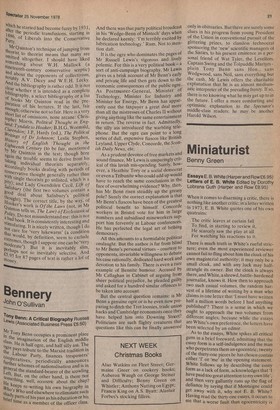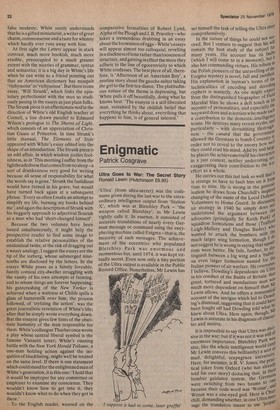Miniaturist
Benny Green
Essays E. B. White (Harper and Row 0.95) Letters of E. B. White Edited by Dorothy Lobrana Guth (Harper and Row E8.95) When it comes to disarming a critic, there is nothing like another critic; in a letter written in 1973, E. B. White quotes one of his own quatrains: • The critic leaves at curtain fall To find, in starting to review it, He scarcely saw the play at all For watching his reactions to it.
There is much truth in White's rueful stricture; even the most experienced reviewer cannot fail to fling about him the cloak of his own magisterial authority; it may only be a small cloak, and with any luck may halfstrangle its owner. But the cloak is always there, and White, a shrewd, battlehardened journalist, knows it. How then to approach two such casual volumes, the random harvest of a lifetime of writing by a man who claims in one letter that 'I must have written half a million words before I had anything published'? There is a sense in which we ought to approach the two volumes from different angles, because while the essays are White's own preference, the letters have been selected by an editor. As to the essays, White spikes all critical guns in a brief foreward, admitting that the essay form is a self-indulgence and the man who perpetrates them an egocentric; twenty of the thirty-one pieces he has chosen contain either 'I' or 'me' in the opening statement. White follows up by describing the essay form as a lack of form, acknowledges that 'I have paid too great attention to my own life', and then very gallantly runs up the flag of defiance by saying that if Montaigne could get away with it, why not E. B. White? Having read the thirty-one essays, it occurs to me that a worse fault than egocentricity is false modesty; White surely understands that he is a gifted miniaturist, a writer of great charm, commonsense and a taste for whimsy which hardly ever runs away with him.
At first sight the Letters appear in stark contrast, much more bookish, much more erudite, preoccupied to a much greater extent with the niceties of grammar, syntax and semantics; it is a big day in White's life when he can write to a friend pointing out that an American dictionary has misspelt 'vichyssoise' as `vichysoisse'. But there is one essay, Will Strunk', which links the epistolary perfectionist with the man so studiously posing in the essays as just plain folks. The Strunk piece is an affectionate nod in the direction of White's old English teacher at Cornell, a line drawn parallel to Edmund Wilson's prologue to The Shores of Light, which consists of an appreciation of Christian Gauss at Princeton. In time Strunk's little manual, The Elements of Style appeared with White's essay edited into the shape of an introduction. The Strunk piece is an odd affair, in which wisdom jostles foolishness, as in 'This morning I suffer from the lightheadedness that comes from no sleep —a sort of drunkenness very good for writing because all sense of responsibility for what the words say is gone.' Strunk the fastidious would have turned in his grave, but would have turned back again at a subsequent phrase. 'Every so often I make an attempt to simplify my life, burning my books behind me'; and again the description of Strunk with his beggarly approach to adjectival flourish as a man who had 'short-changed himself'.
Because the two volumes have been issued simultaneously, it might help the prospective reader to find some image to establish the relative personalities of the unidentical twins; at the risk of dragging out a weary analogy, I suggest the essays are the tip of the iceberg, whose submerged ninetenths are disclosed by the letters. In the essays White poses as a faintly loveable, faintly comical city-dweller struggling with the vanity of his own attempts at farming, and to whom things are forever happening; his gatecrashing of the New Yorker is achieved when a waitress at Childs spills a glass of buttermilk over him; the process followed, of 'stylizing the action', was the great journalistic revelation of White's life; after that he simply wrote everything down. But the essayist gives few hints of the obstinate humanity of the man responsible for them. White's colleague Thurber once wrote a play whose central liberal symbol is the famous Vanzetti letter; White's running battle with the New York Herald Tribune, a one-man holding action against the iniquities of blacklisting, might well be treated on the same level. If there is one statement which could stand for the enlightened men of White's generation, it is this one: 'I hold that it would be improper for any committee or employer to examine my conscience. They wouldn't know how to get into it, they wouldn't know what to do when they got in there.'
To the English reader, weaned on the comparative formalities of Robert Lynd, Alpha of the Plough and J. B. Priestley who takes a tremendous drubbing in an essay about the brownness of eggs—White's essays will appear almost too colloquial, revelling in a slackness of tone rather than looseness of structure, and gaining in effect the more they adhere to the line of egocentricity to which White confesses. The best piece of all, therefore, is 'Afternoon of an American Boy', a routine story about the gauche suitor taking the girl to the first tea-dance. The platitudinous nature of the theme is depressing, but White pulls it off beautifully, doing what he knows best: 'The essayist is a self-liberated man, sustained by the childish belief that everything he thinks about, everything that happens to him, is of general interest.'



































 Previous page
Previous page